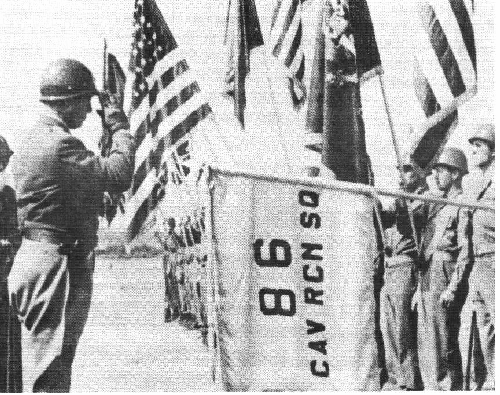
MOPPING UP
The squadron remained at Nobitz until May 14, when it moved 64 miles to Kahla, where it guarded such installations as the Zeiss factory, Reimahg underground air craft factory, power plant, hospital, railroad station and Displaced Persons Camps 1 through 7. Occupying towns to maintain law and order were Troop A, Kleineutersdorf and Freienoria; Troop B, Niederkrossen and Freienoria; Troop C, Rodias and Milda, and later Grosseutersdorf; Troop D, Orlamuende, Eichenberg and Dienstaedt.
The underground aircraft factory guarded by the command proved of great interest to the Allied Air Forces. Gen. Carl A. Spaatz, commanding general of the U.S. Strategic Air Forces in Europe, made a personal inspection of the area.
When the 86th eventually moved out of the Kahla area, Capt. James F. Delaney of Troop E was left behind as senior officer to turn over the territory to the Russians.
"They came charging down the street and set a bunch of houses on fire before we chased them and their horses out of town," Capt. Delaney recalled. "They had a Cossack outfit there and we finally got together with them and everything worked out all right.
"We came out of the area down the Autobahn and I stopped the column for a relief call. As the people climbed down from their vehicles it suddenly dawned on me that the troops had taken out quite a few of the German women they were not supposed to be fraternizing with and were taking them to Frankfurt to join the rest of the squadron. Frankly, we brought a number of them back, as well as some of the children, because the German people in that area wanted no part of the Russian soldier, or the Russians period.
"About two days later I was sent back to get the rest of our equipment, something like one or two 2 1/2-ton trucks, a jeep and a halftrack with a machine gun mounted on it. When we reached the dividing line on the Autobahn we literally were stopped at gunpoint by the Russians, who had set up a roadblock. They told us we couldn't go back into the area and that if we did we would have to leave our weapons with them. At this point I told them either to get the hell out of the way or I would call in the Air Force and bring up some tanks instead of trucks and jeeps and see what developed. The Russian CO backed off and we went ahead and picked up our equipment. The following day they tried to stop us again, but we ran right through the roadblock.
"The irony of the situation is that we were supposed to be allies at that time."

General George S. Patton, Jr. salutes the colors of the 86th Cavalry Reconnaissance Squadron Mechanized after presenting the battle streamers at Airfield Grossostheim near Aschaffensburg, Germany - August 8, 1945 .
![]()
Go to "The Long Voyage Home" or "Table of Contents" page.